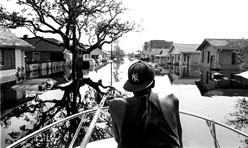|
|
Issue: Race
|
|
As the Katrina disaster unfolded, it became clear that some communities—particularly communities of color—faced greater physical and economic risk than others. Rooted in the nation's history of racial discrimination, these inequalities continue to plague the Gulf Region and beyond. |
|
|
|
|
 |
|
|
Another Black Blues Story |
|
|
Clarence Williams is producing a photographic essay of post-Katrina New Orleans, from flood to aftermath to rebuilding, with a visual emphasis on the remnants of the cultural wealth and family ties that make this city unique. |
|
|  | |
Another Black Blues Story |
| |
|
|
|
|
 |
|
|
Faubourg Tremé |
|
|
Lolis Eric Elie and Dawn Logsdon are working on a feature-length documentary, Faubourg Tremé: The Untold Story of Black New Orleans, which focuses on the historic neighborhood in New Orleans that, during slavery, was home to one of the oldest, most prosperous, and most politically active black communities in the country. |
|
|  | |
Faubourg Tremé: The Untold Story of Black New Orleans |
| |
|
|
|
|
 |
|
|
Gulf Coast: Work in Progress |
|
|
Dee Davis and the Center for Rural Strategies developed a media campaign to illustrate the struggles of rural Gulf Coast residents to re-establish their lives after hurricanes Katrina and Rita. The project aimed to help Americans understand conditions along the rural Gulf Coast and explore how America's failure to formulate effective rural policy is reaping disaster. |
|
|  | |
Gulf Coast: Work in Progress |
| |
|
|
|
|
 |
|
|
Lives Out of Context: A Hurricane of Race |
|
|
Ten photographers from Kamoinge, a New York-based collective of African-American photographers, documented ravished communities impacted by the hurricane and the devastation's far-reaching ramifications on the economic, social, and racial fabric of its residents; the resulting body of work explores the despair, as well as the hope and resilience of the many residents who have lived in these communities for countless generations. |
|
|  | |
Photographs by Russell K. Frederick |
| |  | |
Photographs by Radcliffe Roye |
| |
|
|
|
|
 |
|
|
Living Through the Storm |
|
|
Mark Hertsgaard focused on global warming and interviewed a wide range of people about what went wrong in New Orleans before Katrina, and how ongoing reconstruction and conservation efforts could protect the Gulf Coast in the future. |
|
|  | |
Adapt or Die |
| |
|
|
|
|
 |
|
|
N.O. Justice |
|
|
Chris Tetens and Lauren Thompson are producing the feature-length documentary N.O. Justice, about the failures of the New Orleans criminal justice system and the efforts of a few individuals determined to change it. |
|
|  | |
N.O. Justice |
| |
|
|
|
|
 |
|
|
Not As Seen On TV |
|
|
Two producers from New York City's Downtown Community Television Center (DCTV) traveled to New Orleans to collaborate with two local teen reporters on videos that illustrate how people of all ages are coping after Katrina. The films touch on how art can be used for healing, how residents are helping themselves in the absence of government support, and how issues of race, culture, and poverty continue to play a central role in recovery, relief, and revitalization efforts. |
|
|  | |
Not As Seen On TV |
| |
|
|
|
|
|